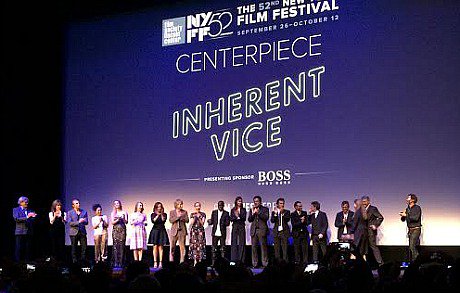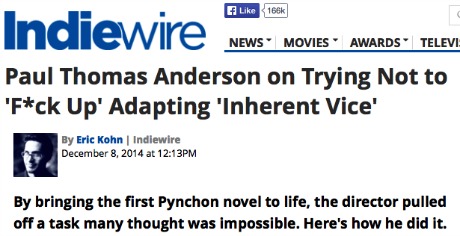All film lovers are down with the idea of Paul Thomas Anderson, or certainly drawn to it. He’s “one of us”…gets it, talks it, walks the walk, etc. But having watched Inherent Vice twice now, once during the New York Film festival and again on a DVD screener, I have to say two things. One, it’s a real pain in the ass. And two, I’m not sure I want to watch it again. Partly because I still can’t make heads or tails of it…and I’m saying this as a huge fan of The Big Lebowski, which was and is about something flaky and hazy, and hilariously so. And partly because I don’t just find Joaquin Phoenix‘s Doc Sportello an irritant — I actually kind of hate him. He’s an affected, doughy-faced, sandal-wearing mumbler whose fate I couldn’t care less about. If he’d been shot at the 30-minute mark I honestly would have thought, “Whoa….okay. But you know what? There’s an upside here.”

I said on 10.5 that “starting with Magnolia my initial exposure to Anderson’s films have felt like stretching exercises or mindfucks of one kind or another — never easy, always a climb or a tangle. And then with the second or third viewing they seem more engaging, less gnarly…of course! I’m fully down with the notion that Inherent Vice may kick into place for me during my second or third viewing, or certainly when I watch the Bluray.” Well, the screener version didn’t kick in and in fact I felt a little more annoyed even though I could finally hear most of the dialogue, which was all but impossible during the NYFF screening. What do I have to do, watch it four or five times to really get it?
Anderson really has to start trying to reach out a bit more. There Will be Blood was masterful (although I never seem to re-watch the Bluray) but the studied opaqueness of The Master was a bit of a problem and Inherent Vice is a huge problem. You know your movie is in trouble when the only passionate love it’s getting is coming from guys known for their bend-over-backwards, turn-the-other-cheek, open-to-all-views experimental sensibilities.
HE to PTA: You’re becoming James Joyce, man, and that’s not altogether cool in the movie racket. Your movies seem to be more and more about themselves and less and less about those snap-crackle-pop connections that happen in a packed theatre. Your movies have to reach out, man. You next film has to be more about engaging people than just being exquisite according to its own rules. You need to get back to where you were when you made Punch Drunk Love. Okay, maybe you can’t go home again but you can’t keep going like you’re going. I’m telling you this as an admirer, man. You’re too absorbed in your own realm. If you started making long-take Romanian movies that were beautiful in and of themselves I wouldn’t be saying this. I’m telling you that I almost fucking hate Inherent Vice, and I don’t like feeling that way.

From a film critic friend: “Yesterday I was surprised and rather appalled at the number of obedient monks at the LA Film Critics Awards voting still adhering to the gospel that PTA is the infallible savior and voting for Inherent Vice in several categories. Not that many of them, to be sure, but still steadfast in their belief.
“I am a very big fan of the book, saw the film twice before writing my review and it could not be clearer that Inherent Vice is a massive disappointment.
“As I suggested, but perhaps not strongly enough, in my review, the first problem is Phoenix, for the big reason that he has absolutely no humor. The ideal casting would have been a young Dustin Hoffman, exhibiting plenty of self-deprecating humor under the hippie veneer. But don’t forget that PTA’s original choice for the role was Robert Downey Jr., which might have worked quite well. But my guess is Downye’s wife didn’t want him diving into a druggie role, and/or something so potentially uncommercial (unlike — ha-ha — the useless The Judge, which he did instead).
“But without an actor like that, who could have brought a humorous undercurrent to the role, Vice was not worth doing, in my opinion — the film’s failure starts there. I suspect it will get a number of near-raves when it finally comes out, but not to recognize the film’s failure represents utter myopia and denial. All you have to do is set is alongside Boogie Nights, representing a parallel milieu in close to the same period and setting, to see how far it falls short.”













